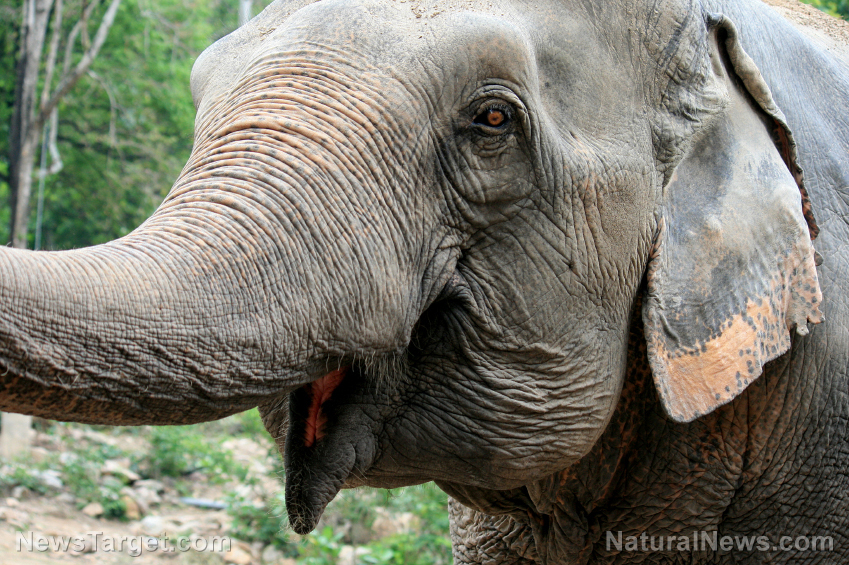Elephants are conscious beings with BODY awareness, new experiments reveal… are they smarter than humans?
04/21/2017 / By Rhonda Johansson

“Dumbo” may be a misnomer. Elephants may be more intelligent than we thought — and trust us, we already thought very highly of these gentle giants. A team from Cambridge University said in a new study that elephants have high levels of self-awareness; an ability that doesn’t develop in human children until at least the age of two. The research showed that elephants recognize their own bodies as obstacles to problem solving, showing amazing capacity to view themselves as separate from the environment.
Who is this cute creature I see? Oh, it’s me!
The standard test for self-awareness for both animals and young children is the mirror self-recognition test; that is, understanding that the reflection is their own. Only four animal species have shown skill in this: great apes, dolphins, magpies, and yes, elephants. Elephants were first tested for this ability more than a decade ago. A 2006 study in the Proceedings of the National Academy of Sciences showed that elephants were able to recognize themselves in the mirror. One specific elephant, which researchers named “Happy,” repeatedly touched her trunk to the white X painted on her forehead that was only visible in the mirror. Researchers of this study concluded that self-awareness is correlated with other higher-levels of thinking. “There seems to be some correlation between an ability to recognize oneself in a mirror and higher forms of social complexity,” said one of the authors of the 2006 study, Joshua Plotnik.
However, environmentalists and animal behaviorists say that the mirror test is not a good indicator for self-awareness. Their argument focuses on the test’s limitation in demonstrating complex thoughts and understanding. Moreover, these critics point out that this test is less useful among animals that rely less on vision than other species. (Related: Learn more about animals and how we interact with them at Natural News Pets.)
Look at that house, Dumbo. You’re standing on the threshold of success!
To address this, researchers from Cambridge developed a stick-and-mat test. This is an adaptation of another test in which young children were asked to push a shopping cart attached to a mat on which they were standing. Twelve elephants were asked to walk on a mat, pick up a stick, and pass it to the experimenter in exchange for a food reward. In control conditions, the sticks were loose, but in the experiment, the sticks were tied to the mat. The new Cambridge study showed that elephants in the experiment condition stepped off the mat 42 out of 48 times, on average, compared with only three out of 48 in the control. This shows that test subjects were able to see their bodies as an obstacle to their progress.
Dr. Joshua Plotnik, visiting researcher at Cambridge and founder of Think Elephants International, said in an article on DailyMail.co.uk that “this is a deceptively simple test, but its implications are quite profound. The elephants understood that their bodies were getting in the way, so they stepped aside to enable themselves to complete the tasks. In a similar test, this is something that young children are unable to understand until they are about two years old.”
In the experiment, Dr. Plotnik and his colleague, Rachel Dale, saw that elephants were able to recognize their weight as preventing them from passing the stick to the researcher unless they walked off the mat. “Elephants are well regarded as one of the most intelligent animals on the planet, but we still need more empirical, scientific evidence to support this belief,” said Ms. Dale. “We know, for example, that they are capable of thoughtful co-operation and empathy, and are able to recognize themselves in a mirror. These abilities are highly unusual in animals and very rare indeed in non-primates. We wanted to see if they also show ‘body-awareness’.”
This new study was published in Scientific Reports.
Sources include:
Tagged Under: animal study, conservation, elephants
RECENT NEWS & ARTICLES
COPYRIGHT © 2017 BRAIN NEWS


















